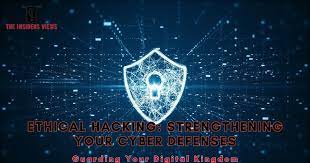In today’s digitally driven world, cybersecurity has become a paramount concern for individuals, businesses, and governments alike. With the increasing frequency and sophistication of cyber attacks, organizations are constantly seeking ways to fortify their defenses against potential threats. Ethical hacking emerges as a vital strategy in this endeavor, offering a proactive approach to identifying and remedying vulnerabilities before malicious actors can exploit them.
Introduction to Ethical Hacking
Ethical hacking, also known as penetration testing or white-hat hacking, involves authorized professionals employing the same techniques as malicious hackers to assess the security posture of a system or network. However, unlike their malicious counterparts, ethical hackers operate with the explicit consent of the organization to identify weaknesses and suggest remedial actions.
The Role of Ethical Hackers
Ethical hackers play a crucial role in enhancing cybersecurity by simulating real-world cyber attacks to evaluate the effectiveness of existing security measures. Their primary objectives include uncovering potential vulnerabilities, assessing the resilience of defenses, and providing actionable insights to strengthen security posture.
Strengthening Cybersecurity
One of the fundamental aspects of ethical hacking is the systematic identification of vulnerabilities within an organization’s infrastructure. Through methods such as penetration testing and vulnerability assessments, ethical hackers can pinpoint weaknesses that could be exploited by malicious entities. By addressing these vulnerabilities proactively, organizations can significantly reduce the risk of security breaches and data compromises.
Importance of Ethical Hacking in Organizations
Ethical hacking is particularly invaluable for organizations entrusted with sensitive data, such as financial institutions, healthcare providers, and government agencies. By conducting regular security assessments and implementing recommended safeguards, these entities can safeguard confidential information, maintain regulatory compliance, and uphold their reputation in the face of evolving cyber threats.
Ethical Hacking Tools and Techniques
Ethical hackers leverage a plethora of specialized tools and techniques to uncover vulnerabilities and exploit them in controlled environments. From network scanners and password crackers to social engineering tactics, these tools enable ethical hackers to assess security controls comprehensively and identify potential points of weakness.
Ethical Hacking Certifications
For aspiring ethical hackers, obtaining relevant certifications is essential to validate their skills and expertise in the field. Certifications such as Certified Ethical Hacker (CEH) and Offensive Security Certified Professional (OSCP) are highly regarded within the cybersecurity community and can significantly enhance career prospects.
Ethical Hacking vs. Malicious Hacking
While ethical hacking and malicious hacking share common techniques, their intentions and ethical considerations differ significantly. Ethical hackers operate within legal and ethical boundaries, seeking to improve security posture and protect against cyber threats, whereas malicious hackers exploit vulnerabilities for personal gain or malicious intent, often resulting in financial losses and reputational damage for targeted entities.
Steps to Become an Ethical Hacker
Becoming an ethical hacker requires a combination of technical expertise, ethical principles, and continuous learning. Prospective ethical hackers typically pursue degrees in computer science or cybersecurity, acquire hands-on experience through internships or entry-level positions, and obtain relevant certifications to demonstrate their proficiency in ethical hacking methodologies.
Case Studies and Examples
Numerous real-world examples illustrate the efficacy of ethical hacking in fortifying cybersecurity defenses. From identifying critical vulnerabilities in software systems to thwarting sophisticated cyber attacks, ethical hackers have played a pivotal role in safeguarding organizations against potential threats.
Challenges and Future Trends
Despite its effectiveness, ethical hacking faces challenges such as keeping pace with evolving cyber threats, addressing ethical dilemmas, and ensuring compliance with regulatory requirements. Looking ahead, advancements in artificial intelligence, blockchain technology, and quantum computing are poised to reshape the landscape of cybersecurity, presenting both opportunities and challenges for ethical hackers.
Ethical Hacking in Different Sectors
Ethical hacking finds application across various industries, including healthcare, finance, and government. In healthcare, for instance, ethical hackers help identify vulnerabilities in electronic health records systems and medical devices, safeguarding patient data and ensuring regulatory compliance.
Ethical Hacking Best Practices
Adhering to best practices is essential for ethical hackers to maintain integrity and credibility in their work. Continuous learning, collaboration with cybersecurity professionals, and adherence to ethical guidelines are paramount to ensuring the effectiveness and legitimacy of ethical hacking efforts.
Ethical Dilemmas in Hacking
Ethical hackers often encounter dilemmas related to privacy, consent, and legality in the course of their work. Balancing the need for security with respect for individual privacy rights and compliance with legal regulations requires careful consideration and adherence to ethical principles.
Ethical Hacking for Small Businesses
Small businesses are increasingly targeted by cybercriminals due to their limited resources and perceived vulnerabilities. Ethical hacking offers cost-effective solutions for small businesses to assess and mitigate security risks, empowering them to protect their assets and maintain operational continuity.
Conclusion
In conclusion, ethical hacking serves as a cornerstone of modern cybersecurity practices, enabling organizations to fortify their defenses and mitigate potential threats effectively. By embracing ethical hacking principles, organizations can proactively identify and remediate vulnerabilities, safeguard sensitive data, and uphold trust and confidence in the digital ecosystem.
Unique FAQs
What distinguishes ethical hacking from malicious hacking?
-
Ethical hacking is conducted with the explicit consent of the organization to identify and remediate vulnerabilities, whereas malicious hacking involves exploiting vulnerabilities for personal gain or malicious intent without authorization.
How can ethical hacking benefit small businesses?
-
Ethical hacking provides cost-effective solutions for small businesses to assess and mitigate security risks, protecting their assets and maintaining operational continuity in the face of evolving cyber threats.
What certifications are recommended for aspiring ethical hackers?
-
Certifications such as Certified Ethical Hacker (CEH) and Offensive Security Certified Professional (OSCP) are highly regarded within the cybersecurity community and can significantly enhance career prospects for ethical hackers.
What are some emerging trends in ethical hacking?
-
Advancements in artificial intelligence, blockchain technology, and quantum computing are poised to reshape the landscape of cybersecurity, presenting both opportunities and challenges for ethical hackers.
How can organizations integrate ethical hacking into their cybersecurity strategy?
-
Organizations can incorporate ethical hacking through regular security assessments, penetration testing, and collaboration with certified ethical hackers to identify and remediate vulnerabilities effectively.

